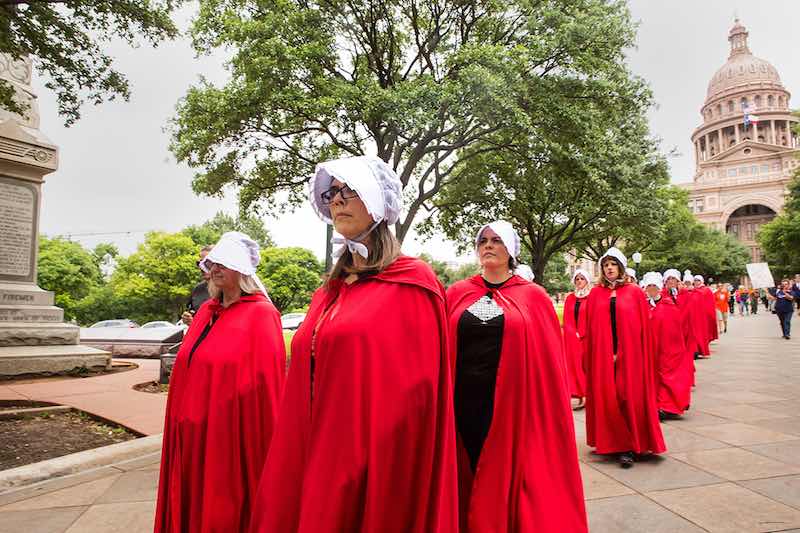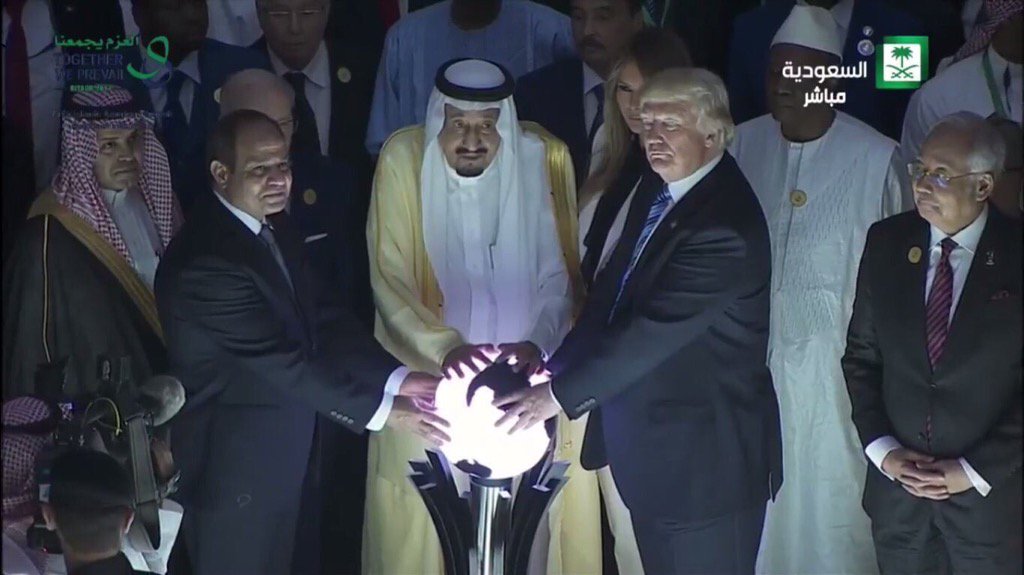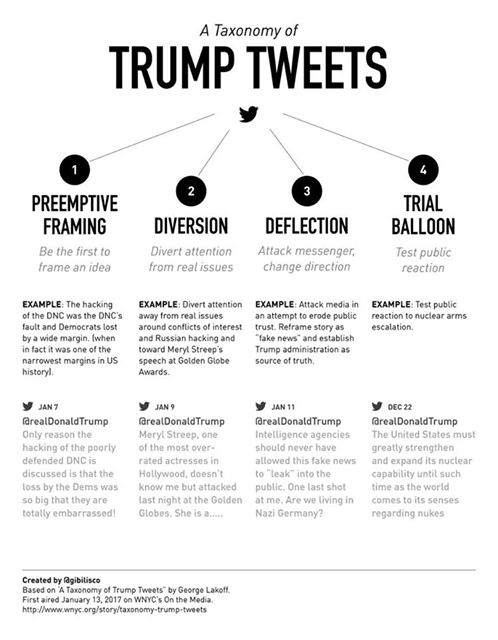The question for this Court, distilled to its essential form, is whether the Constitution remains "a law for rulers and people, equally in war and peace." And if so, whether it protects Plaintiffs' right to challenge an Executive Order that in text speaks with vague words of national security, but in context drips with religious intolerance, animus, and discrimination.
-- Chief Judge Roger Gregory, 4th Circuit Court of Appeals, 5-25-2017
This week's featured post is "On Memorial Day we ought to remember the dead, not celebrate the Empire."
This week everybody was talking about Jared Kushner
Last Monday, it had just come out that the FBI was interested in one of Trump's senior advisers, and a lot of people who didn't know anything for sure were speculating that it would be Jared. Whoever it turned out to be, the significance of the report was that the Russia problem didn't just concern people who used to work for Trump, like Michael Flynn and Paul Manafort, but also someone who was still playing a major role in the Trump administration.
Well, it is Jared, and the story is stranger than any speculation I had run into:
Jared Kushner and Russia’s ambassador to Washington discussed the possibility of setting up a secret and secure communications channel between Trump’s transition team and the Kremlin, using Russian diplomatic facilities in an apparent move to shield their pre-inauguration discussions from monitoring, according to U.S. officials briefed on intelligence reports.
Monitoring by American intelligence services, that is. This does not seem to be illegal (although omitting the meeting with the Russian ambassador from his security-clearance application is illegal), but it raises all sorts of questions: He was already talking to the Russian ambassador face-to-face; who in the Kremlin did he want to talk to and about what? Why seek to hide those messages from the Americans?
Words like espionage are being thrown around by people who don't use that term lightly. Some speculate that the inexperienced Kushner simply didn't understand what he was suggesting. But he went to the meeting with Flynn, who would have understood it. The New Yorker's Ryan Lizza sums up:
We still don’t have a crime in this case, but there is an awful lot of coverup.
The NYT puts a different slant on this story:
the idea was to have Mr. Flynn speak directly with a senior military official in Moscow to discuss Syria and other security issues.
Though why that conversation required dodging American intelligence isn't clear. Another cryptic part of the NYT article says this:
And less than two weeks later, the idea was dropped when Mr. Trump announced that Rex W. Tillerson, a former chief executive of Exxon Mobil who had worked closely with Russian officials on energy deals, was his choice to become secretary of state.
My working model of Kushner resembles in part my working model of Trump, and maybe reflects my own class prejudice: I imagine that being born at the top of a real estate empire convinced Jared that he's a lot smarter than he actually is, and shielded him from the criticism he needed if he was going to form an accurate view of his place in the world.
That model is supported by someone who actually knows Kushner: Elizabeth Spiers, who edited New York Observer for him.
I don’t even know how to quantify Kushner’s expertise, anyway. Yes, he ran the company — which he inherited, not uncommon in New York’s dynastic, insular real estate world. But he was sure he had the goods. When I worked for him, I didn’t think he had a realistic view of his own capabilities since, like his father-in-law, he seemed to view his wealth and its concomitant accoutrements as rewards for his personal success in business, and not something he would have had in any case. To me, he appeared to view his position and net worth as the products of an essentially meritocratic process.
It's not hard to imagine such a person getting in over his head, and being manipulated by well-trained operatives like Ambassador Kislyak and General Flynn.
If you'd ever wondered why Putin would prefer Trump to Clinton, Trump's meeting with our European allies in Brussels made it clear. In Brussels, Trump continued to work on Putin's agenda, insulting our European allies
According to a report in the German daily Süddeutsche Zeitung, many EU officials were appalled by how little the Americans appeared to know about trade policy. The guests from Washington seemed not to be aware that EU member states only negotiate trade treaties as a bloc. According to the paper, Trump's chief economic advisor, Gary Cohn, claimed during meetings, for example, that different customs tariffs are in place between the U.S. and Germany than between the U.S. and Belgium.
and undermining NATO. Trump's advisers had led everyone to believe that his speech would finally unequivocally endorse the center of the treaty defining the alliance: Article 5, the one the obligates all the NATO countries to come to one another's defense. He didn't. Instead he continued to peddle a fiction from his campaign: that most NATO countries "owe money" either to the United States or to the alliance. They don't.
Whether Vladimir Putin has something on Donald Trump or somehow has him in his pay hardly matters. If he doesn’t, he apparently doesn’t need to do since Trump insists on doing more or less exactly what Putin would want of him entirely on his own.
To undermine NATO in this way has, of course, been a core goal of Russian (and, earlier, Soviet) foreign policy as long as NATO has existed. And through all the ups and downs of the Cold War and post-Cold War eras, Russia has never scored a success on that front as striking as Donald Trump’s elevation to the presidency and his continued refusal to affirm that the United States will defend its allies. Why exactly Trump won’t do that remains a mystery, but the conduct itself is striking — in some ways all the more so because it involves Trump overruling the professional opinion of his own aides in favor of a different, more Russia-friendly line.
Here we see a photo of three NATO leaders and what appears to be a cardboard cut-out of Trump.
and the budget
Budgets are important as statements of values. One clear headline value of the Trump budget is an overwhelming preference for cutting taxes on high-income families over providing food, medical care, housing assistance, and other support to low-income families.
Stranger than that, though, is that the whole thing seems to be based on an obvious double-counting error of something that maybe shouldn't even have been counted once. Trump's unspecified tax cuts are supposed to pay for themselves by generating revenue from economic growth -- a dubious proposition already. But that increased growth is used again to increase revenue beyond what the current system would produce. The mistake is sizeable: $2 trillion over ten years.
and health care
The CBO analysis of the ObamaCare repeal-and-replace bill that the House passed came in. The previous version of the bill would increase the number of uninsured people by 24 million in ten years. The version the House passed (without waiting for the CBO analysis) gets that number down to 23 million.
Senate Republicans claim they're going to do something different, but they have the same underlying problem that the House did: Republicans have made more promises than they can deliver on. 23 million extra uninsured people is the price of delivering on all the Republicans other promises: cutting taxes, reducing the deficit, giving insurance companies more freedom, and so on.
I don't doubt that the Senate can lower that number, but to do so it will have to turn its back on promises the House fulfilled. I still don't see a compromise that gets enough votes to pass in both chambers.
and two court decisions
The 4th Circuit Court of Appeals rejected the Trump administration's appeal to lift a lower court's injunction against its Muslim Ban. It wasn't close: 10-3.
The entire issue is whether you take the President at his word: Trump's executive order (which Chief Judge Roger Gregory abbreviated EO-2, to distinguish it from the first version, EO-1, which Trump withdrew after the 9th Circuit ruled against it) is what judges call "facially neutral". Its text says nothing about Muslims or religion; it's all about national security.
However, if you read EO-2 in the context of EO-1 and in the context of Trump's campaign promise to ban Muslims from entering the country "until our country's representatives can figure out what the hell is going on", it's easy to make the case that EO-2 is all about religious discrimination. That's how Gregory's majority opinion views it.
Based on this evidence, we find that Plaintiffs have more than plausibly alleged that EO-2’s stated national security interest was provided in bad faith, as a pretext for its religious purpose. ...
EO-2 cannot be divorced from the cohesive narrative linking it to the animus that inspired it. In light of this, we find that the reasonable observer would likely conclude that EO-2’s primary purpose is to exclude persons from the United States on the basis of their religious beliefs.
From here, it goes to the Supreme Court.
Right now, the administration claims this isn't a Muslim ban at all, and that the resemblance to what he promised on the campaign trail is just coincidental. But does anyone doubt Trump's tune will change the instant the Supreme Court says it's constitutional? Within a week, he'll hold a rally somewhere and say, "I promised you a Muslim ban, and I delivered."
Critics of the decision argue that the judges are playing politics. But I think they should be forced to answer the question the judges had to address: Do you believe the executive order was made in good faith, and not as an attempt to limit Muslim immigration simply because they are Muslims?
Clarence Thomas was the deciding vote on the liberal side of a racial gerrymandering case: The Supreme Court rejected two congressional districts in North Carolina. His concurring opinion is very brief, so it's not entirely clear what he's thinking.
There are other gerrymandering cases to be decided before the Court goes on its summer break, so I'll save more detailed comments until they come in.
and you might also be interested in
Remember how Trump was going to sort-of comply with the Emoluments Clause of the Constitution by tracking how much of his business' profits came from foreign governments and voluntarily donating that much to the Treasury? Well, never mind. Rather than produce a transparent, auditable plan for calculating foreign-government profit, the Trump Organization sent Congress a glitzy eight-page brochure describing a process full of holes.
The short version: If they get checks that say "Government of Russia" or "Sovereign Wealth Fund of Kuwait", they'll keep track of the amounts and assume that the net profit rate on that property applies to that payment. (This blows off the distinction between average profit and marginal profit, and allows them to do bookkeeping tricks with depreciation.) But the TO considers it "impractical" to track foreign-government payments more subtle than that.
So, for example, if the Russian Embassy decides to throw its Christmas Party at the Trump International Hotel in Washington (pictured below), the profit on that revenue would count as foreign-government income, unless the hotel can find enough depreciation to declare a paper loss that year. But if one of Putin's billionaire buddies throws a Christmas Party and happens to invite the ambassador and everybody from the Russian Embassy, that wouldn't count.
Reading the brochure, you have to keep reminding yourself that we're talking about violating Article I, Section 9 of the effing Constitution. That clause says that foreign-government money can't be accepted in the first place "without the consent of Congress", which Trump has not even sought. Obeying the Constitution is often inconvenient, but convenience has never been the standard.
I continue to refuse to go after Melania (for anything other that profiteering off the presidency). This week's Melania story was about her wearing a very expensive jacket. But I defended Hillary Clinton wearing a somewhat less expensive (but still very pricey) jacket during the campaign, and I extend that defense to Melania: We pay way too much attention to the clothes and hair and shoes of women in public life. If they err on the side of frugality, they're frumpy. If they err on the side of expense, they're Marie Antoinette. Men face no comparable choice.
I've been following the problems Kansas has had after the Brownback tax cuts. Sunday, the WaPo looked at Oklahoma, where a combination of tax cuts and a decline in oil revenues has the state cutting back on -- what else? -- education: four-day weeks, 49th in teacher pay, big class sizes, etc.
The year's best feminist protest was at the Texas State Capitol:

The special election for the House seat in Montana had what is starting to feel like a familiar result: The Republicans held onto the seat by less that they ordinarily would have. Assaulting a reporter on election eve appeared to make no difference. Some Republicans actually liked it.
Despite last week's rumor, Joe Lieberman won't be the new FBI director.
Cultural appropriation is when somebody from a dominant culture tries to acquire fame and fortune (or just look cool) by using stuff created by a dominated culture. (I've written about it before.) Sometimes it's done with respect and a share-the-wealth attitude. (Paul Simon didn't just steal the South African sound, he toured with and helped popularize authentic South African bands.) Sometimes it's annoying and disrespectful, but relatively harmless (like Anglos who have no idea what Cinqo de Mayo commemorates "celebrating" by drinking too much tequila). And sometimes it results in a significant injustice, like Elvis becoming a musical icon while the black pioneers he imitated couldn't get radio time.
Crystal Contreras uses a local controversy about a Anglo-owned burrito shop to make a very good point: Cultural appropriation is mostly an effect of injustice. It happens because a dominance relationship already exists. Beating it back may be emotionally satisfying, but doesn't do much to solve the underlying problem.
It's just that cultural appropriation is not what caused these inequalities in the first place, and it's just one arm of a much larger system that makes it so POCs are not seen as experts on our own cultures.
Instead, I'm more interested in confronting the entire apparatus in place that make it so the dude who fell in love with Mexico on spring break is able to open a tamale bar in the ultra-gentrified Hipsterfuck Chill District, while the woman from Mexico has to risk arrest to sell tamales out of a cooler in front of the grocery store.
Her piece doesn't claim to be the final word on the subject, but it's a worthwhile contribution to the discussion.
and let's close with an old song updated
Paul Simon and Stephen Colbert redo "Feelin' Groovy" for 2017.









